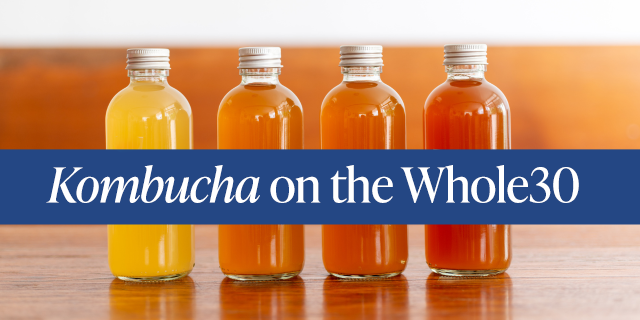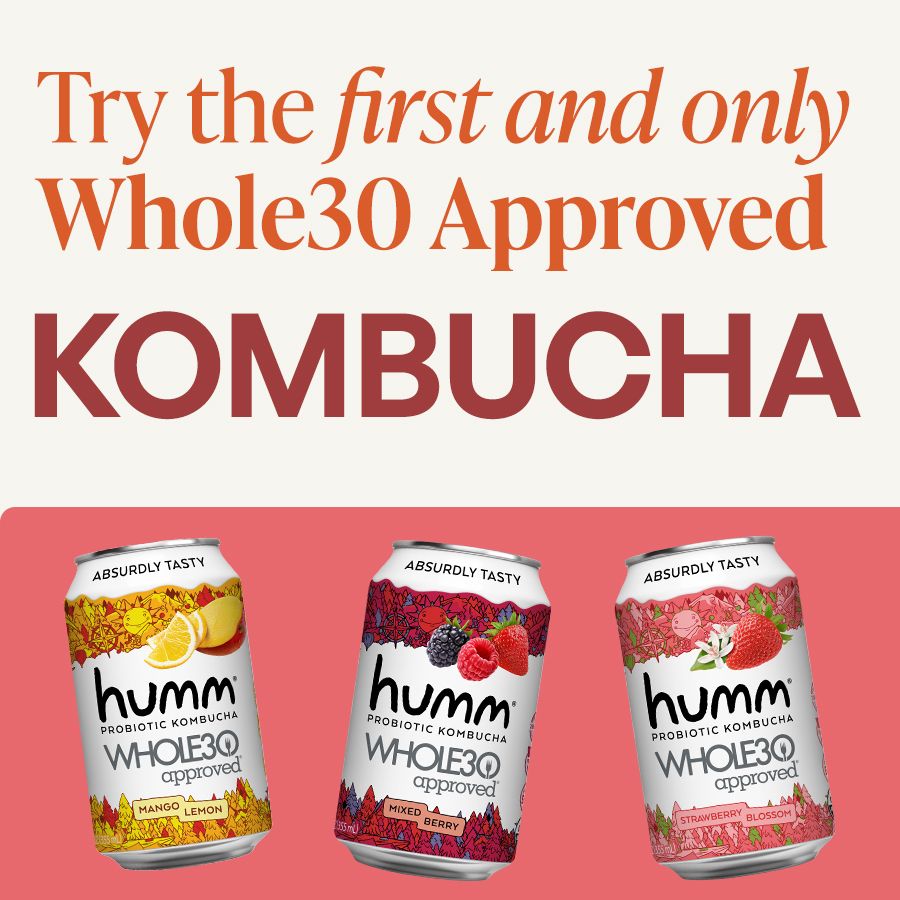By Melissa Urban
Curious about kombucha? Read on for an explanation of this popular fermented beverage. If you are looking for a Whole30 Approved kombucha option, check out our collaboration with Humm Kombucha.
Kombucha—a fermented tea—is a delicious beverage that may add some probiotic benefits to your already healthy Whole30 diet. But “Is kombucha Whole30-compatible?” isn’t the easiest question to answer. This article is designed to give you an insider’s look into the thought process behind the Whole30 rules, and explain a bit about why this subject is actually legitimately confusing.
It’s not just you. It was confusing for me too. I’ll do my best to explain.
Kombucha Basics
Kombucha is a fermented tea dating back 2,000 years, to ancient China. It requires water, tea, sugar, and an active starter culture of bacteria and yeast (called a SCOBY)*. You start with a black or green tea, then add spring water, your SCOBY (Symbiotic Culture of Bacteria and Yeast), and cane sugar. You then cover it, store it, and allow it to ferment for 7-30 days, to taste. (The longer it ferments, the more sour it becomes.)
*Note, there are many kombucha recipes and techniques out there. There is no one “right” way; it’s all based on personal preference. I’m just giving you the very basics here as an example.
But SUGAR is not Whole30!
Added sugar of any sort is not permitted on the Whole30, true. But in this case, the sugar isn’t added to the product after the fact, it’s used in the beginning to feed the SCOBY. That’s how it ferments. Sugar is a necessary part of this fermentation process.
Does ALL the sugar get “eaten up”?
Well, no, that’s actually a myth. Some sugar remains, depending on how long you ferment. The longer you ferment, the less sugar is left.
Doesn’t kombucha contain alcohol, and isn’t that a no-no too?
Well, yes. But again, alcohol isn’t added to the product, it’s a natural byproduct of fermentation. Most things with a high sugar content (fruit, fruit juices) have bacteria that, through fermentation, produce ethanol—even orange juice! This natural fermentation by-product is not implied in the Whole30 rules, so in this article, we’re just going to focus on the sugar.
What about store-bought kombuchas? Are there sugar in those too?
Yes, there is. But this is where it gets really Whole30-tricky.
Kombucha labeling and the Whole30 Program Rules
The Whole30 rules say, “No added sugar; if there is any form of sugar on the ingredient list, it’s out.” This makes the program really easy to follow. Just read your labels, and if you see any form of sugar listed with the other ingredients, put it back on the shelf.
The trouble is, kombucha labeling isn’t as tightly regulated as other food labeling. That’s because it’s controlled by the FDA, not the USDA. This is why some kombucha brands list sugar in their ingredients, while others do not.
Let me be clear—ALL kombucha uses some form of sugar in the fermentation process. Sometimes the sugar is in the form of a traditional sugar, like white or cane sugar. Sometimes (as in the case of our Whole30 Approved collaboration with Humm – save 15% with code BERRYGOOD through 8/31), it is in the form of fruit juice.
Most kombucha brands who use a traditional form of sugar (like cane sugar) say so in their ingredient list. (Sometimes, they’ll including a parenthetical, saying “used for fermentation.”) This means if you’re browsing kombucha at Whole Foods, anything that says “sugar” in the ingredient label, even if the sugar is used for fermentation, is out for the duration of your Whole30. (Some brands also add sugar after fermentation, to make their beverage sweeter. This part isn’t tricky; if it’s sweetened, it’s out for your Whole30 elimination.)
However, because of the looser labeling regulations, some brands choose not to include the sugar used in fermentation on their ingredient label. This is obviously less transparent, but the lack of sugar in the ingredients means the product is Whole30 compatible.
The final word
Confusing? It can be. (And we don’t love that some brands have historically chosen to leave the sugar out of their ingredient list, just because they can.)
That’s why we’re excited about the delicious Whole30 Approved varieties of Humm Kombucha. This takes all of the guesswork out of choosing a compatible kombucha! When you see our Whole30 Approved logo on the can, you know it’s compatible, no label reading required.
In summary, here is a quick-read guide to kombucha during the Whole30 elimination phase:
- If you make kombucha at home and don’t add sugar after the fermentation process, is that Whole30-compatible? YES. Because sugar isn’t added to sweetened the beverage, only to aid in fermentation, this is a budget-friendly way to enjoy kombucha on the Whole30.
- If you see store-bought kombucha and sugar is not listed in the ingredients, is that Whole30-compatible? YES.
- If you see store-bought kombucha and you see fruit juice listed as the “sugar” source, is that Whole30-compatible? YES.
- If you see store-bought kombucha and see any form of added sugar (besides fruit juice) in the ingredients, whether used for fermentation or as an added sweetener, is that compatible? NO.
- If you see store-bought kombucha with a Whole30 Approved logo, is that compatible? YES, automatically!
Your best bet for store-bought kombucha on the Whole30 are any of Humm Kombucha’s delicious Whole30 Approved flavors. Otherwise, read your labels carefully, and avoid any kombucha that isn’t compatible with the Whole30 Program Rules.


















